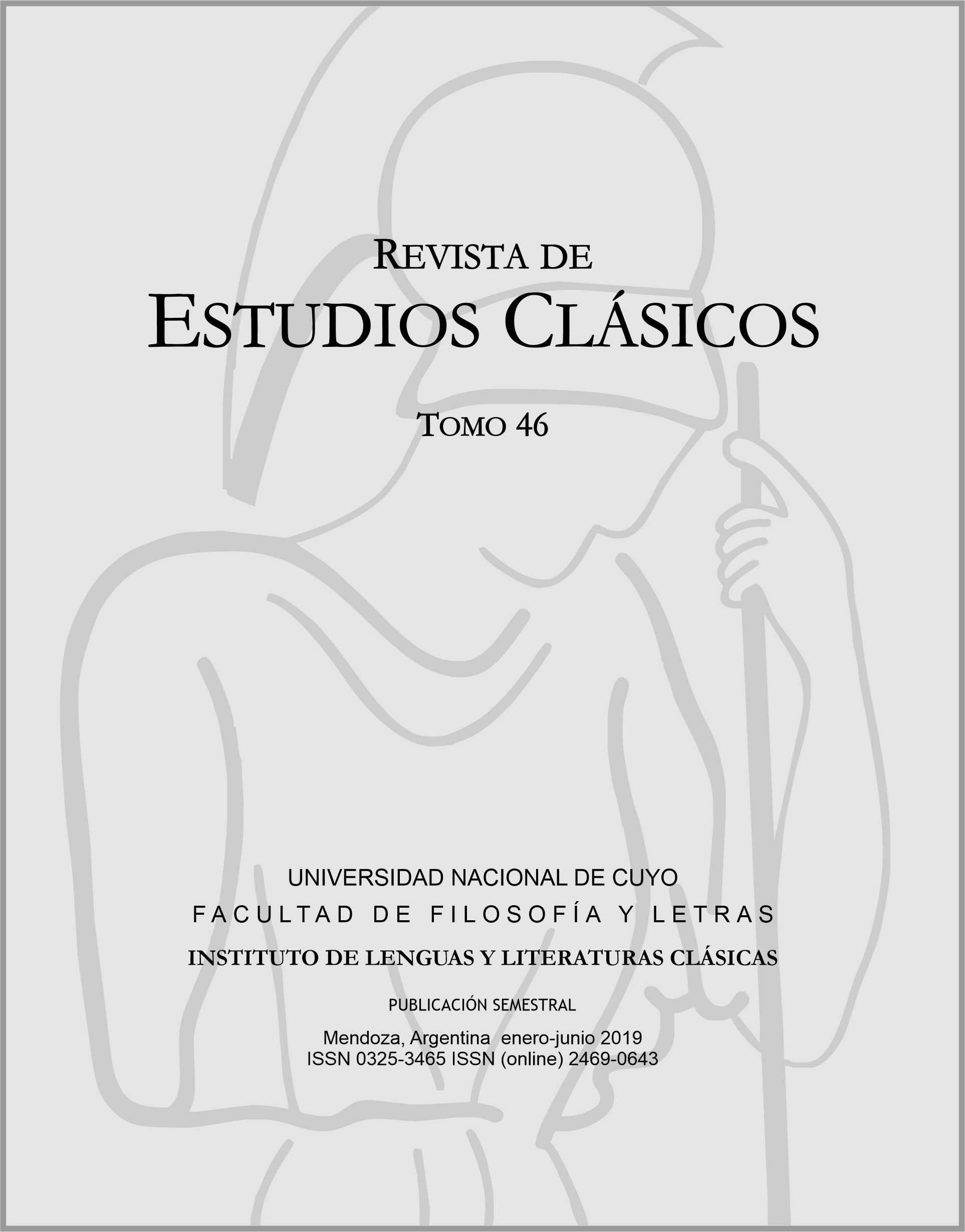El potencial persuasivo de los montajes poético-imaginarios: una consideración retórico-lucreciana
Keywords:
rhetoric, somnium, simulacrum, image, voluntas, timorAbstract
The interpretations of the controversial relationship between rhetoric and Epicureanism in De rerum natura do not contemplate the rhetorical considerations presented by Lucretius. This omission narrows the margin of interpretation attempting, above all, against the possibility of appreciating the originality of his thinking. Given this circumstance, we pretend reopen the discussion with the objective of taking the first steps in the establishment of an alternative and complementary approach that allows us to end with this omission. We hope to achieve this, assuming that one of his rhetorical considerations occurs when the philosopher attributes to certain poetic-imaginary montages the status of persuasive medium. Guided by this assumption, our work will consist in pointing out the terms in which it makes such attribution and revealing on which foundations this is sustained.
References
_________ (1984). Epicurus' Scientific Method. London: Ithaca.
Bailey, C. (1922). Titi Lucreti Cari. De rerum natura libri sex. Oxonii: E Typographeo Clarendoniano.
_________ (1926). Epicurus. The Extant Remains (With short critical apparatus, translation and notes). Oxford: The Clarendon press.
_________ (1940). The Mind of Lucretius. The American Journal of Philology, LXI (3), 278-291. Recuperado el 2 de diciembre de 2015, de
http://www.jstor.org/stable/290933
Blank, D. (1995) Philodemus on the Technicity of Rhetoric. En Obbink D. (Comp.). Philodemus and poetry: poetic theory and practice in Lucretius, Philodemus, and Horace (pp. 178–188). New York: Oxford University Press.
Boyancé, P. (1963) Lucrèce et l’épicurisme. Paris: Presses Universitaires De France.
Brown, R. (1987). Lucretius on Love and Sex: A Commentary on De rerum natura IV, 1030–1287. (With prolegomena, text and translation). Leiden-New York: E.J. Brill.
Calboli, G., (2003) Lucrezio e la retorica, Paideia, LVIII, 187–206.
Císař, K. (2001). Epicurean Epistemology in Lucretius' De rerum natura IV 1-822. Listy Filologické / Folia Philologica, CXXIV (1/2), 1-54. Recuperado el 8 de
octubre de 2015, de http://www.jstor.org/stable/23468032
Classen, C. (1968). Poetry and Rhetoric in Lucretius. Transactions and Proceedings of the American Philological Association, XCIX, 77-118. Recuperado
el 10 de marzo de 2016, de http://www.jstor.org/stable/2935834
Dalzell, A. (1974). Lucretius' exposition of the doctrine of images. Hermathena, CXVIII, 22-32.
De Lacy, Ph., y Benedict E. (1967) Plutarch’s Moralia in XV Volumes. V. 14. Cambridge: Loeb Classical Library.
Ernout, A. & Robin, L. (1962). Lucrèce. De rerum natura: commentaire exégétique et critique, précédé d'une introduction sur l 'art de Lucrèce et d 'une traduction des lettres et pensées d 'Épicure (Vols. 1-3). (2a ed). Paris: Les Belles Lettres.
Glidden, D. (1979). Sensus and Sense Perception in the De rerum natura. California Studies in Classical Antiquity, XII, 155-181. Recuperado el 20 de
octubre de 2016, de www.jstor.org/stable/25010746
Godwin, J. (1992). Lucretius. De rerum natura IV (Edited with translation and commentary). Warminister, Wiltshire: Aris & Phillips Ltd.
Hicks, R. (1925). Diogenes Laertius. Lives of the eminent philosophers (With an English translation) (V. 2). New York: Putnam Ìs sons; London: Heinemann.
Lathière A. (1972). Lucrece Traducteur d'Epicure: Animus, Anima dans les Livres 3 et 4 du De Rerum Natura. Phoenix, XXVI (2), 123-133. Recuperado el 20 de
noviembre de 2016, de http://www.jstor.org/stable/1087712
Marković, D. (2008). The rhetoric of explanation in Lucretius' De rerum natura. Leiden-Boston: Brill.
Mattos, R. (2016). Las incidencias de un recorte de la doctrina de los simulacra sobre las cuestiones relativas al amor en el De rerum natura de Lucrecio. (Tesis
de Licenciatura) UNSAM - EH. Recuperado el 17 de junio de 2017, de http://bit.ly/2f0VuzO
Milanese, G. (1989). Lucida carmina: comunicazione e scrittura da Epicuro a Lucrezio. Milán: Vita e pensiero.
Munro, H. [1864] (2009). Titi Lucreti Cari. De Rerum Natura Libri Sex (With a translation and notes). Cambridge: Cambridge University Press.
Schiesaro, A. (1987). Lucrezio, Cicerone, l'oratoria. Materiali E Discussioni per L'analisi Dei Testi Classici, (19), 29-61.
___________ (1989). A Note on Lucretius 4.1046. The Classical Quarterly, XXXIX (2), 555-557. Recuperado el 8 de septiembre de 2016, de http://www.jstor.org/stable/639396
Schrijvers, P. (1970). Horror ac divina voluptas; études sur la poétique et la poésie de Lucrèce. Amsterdam: A.M. Hakkert.
Sedley, D. (2004). Lucretius and the transformation of Greek wisdom. Cambridge England; New York: Cambridge University Press.
Thury, E. (1987). Lucretius' Poem as a Simulacrum of the Rerum Natura. The American Journal of Philology, CVIII (2), 270-294. Recuperado el 18 de
noviembre de 2016, de http://www.jstor.org/stable/294817
Valentí Fiol, E., [1976] (2012). Lucrecio. De rerum natura. De la naturaleza (Introducción, traducción y notas). Barcelona: Acantilado.
Wallach, B., (1975), Lucretius and the Diatribe: De Rerum Natura II. Leiden: E.J. Brill.
Downloads
How to Cite
Issue
Section
License
Aquellos autores/as que tengan publicaciones con esta revista, aceptan los términos siguientes:
- Los autores/as conservarán sus derechos de autor y garantizarán a la revista el derecho de primera publicación de su obra, el cuál estará simultáneamente sujeto a laLicencia Creative Commons Atribución-NoComercial-CompartirIgual 2.5 Argentina (CC BY-NC-SA 2.5 AR). (https://creativecommons.org/licenses/by-nc-sa/2.5/ar/)que permite a terceros compartir la obra siempre que se indique su autor y su primera publicación esta revista.
- Los autores/as podrán adoptar otros acuerdos de licencia no exclusiva de distribución de la versión de la obra publicada (p. ej.: depositarla en un archivo telemático institucional o publicarla en un volumen monográfico) siempre que se indique la publicación inicial en esta revista.
- Se permite y recomienda a los autores/as difundir su obra a través de Internet (p. ej.: en archivos telemáticos institucionales o en su página web) antes y durante el proceso de envío, lo cual puede producir intercambios interesantes y aumentar las citas de la obra publicada. (Véase El efecto del acceso abierto).












